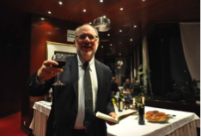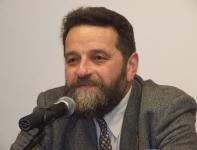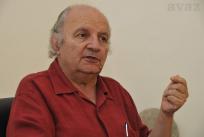PROGRAM
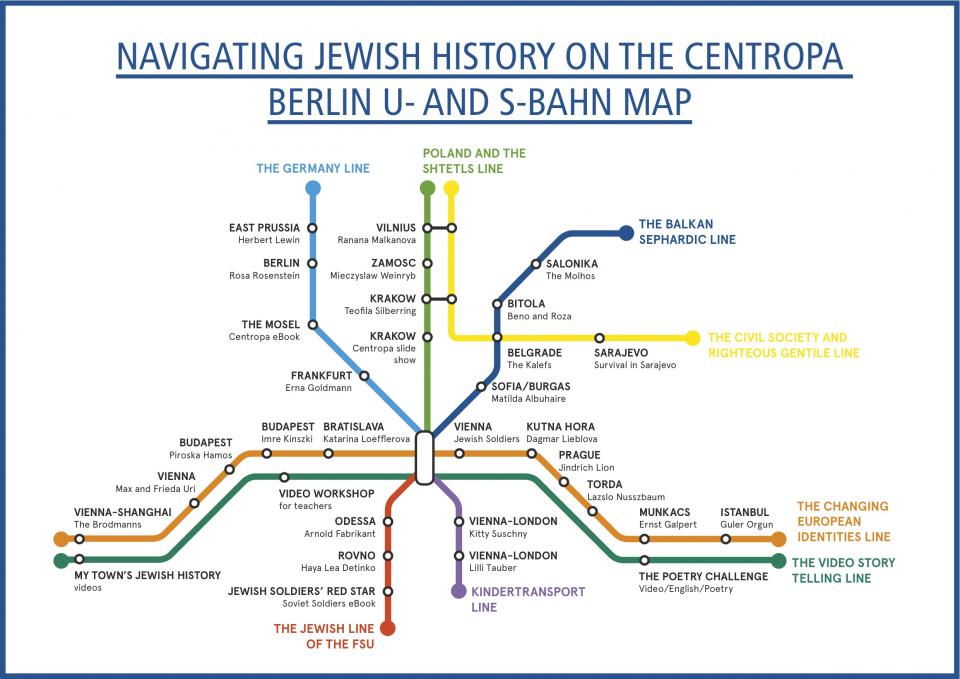
This year, participants are going to "travel" on four mandatory lines: The Germany Line, the Balkan Sephardic Line, the Poland and the Shtetls Line, and the Civil Society and Righteous Gentile Line. You will also choose one "elective line". For more information, consult the "Elective Lines" section of this homepage!
Download PDF:
JUMP TO...
Note: this year, we are going to give each participant your own blog site, so you can take pictures and post them, and your thoughts during CSA VII. That means: be sure to bring either your smart phone (with a camera) or a digital camera with you every day.
Note on note takers: something new this year is that ahead of each session, we are going to assign participants to listen to that presentation, make notes, then give five minute summaries to the entire group at the end of each session. We’ll also ask you to upload that summary to our website.
Our Scholars
Day one. Tuesday, 23 July 2013
Check-in at hotel upon arrival (your rooms might not be ready before the afternoon but you can store your luggage).
12:30 Meet in hotel lobby. Centropa employees will walk with you to our meeting point for lunch. Note: be prepared for walking tour; you will not need laptops until the evening program.
13:00 Welcome lunch at Café Orange, Oranienburgerstr. 32
Participants will sit according to networks:
Israeli and German teachers
Balkan and Austrian teachers
Other EU Public/US Public schools, including Lithuanian, Polish, Hungarian, Romanian teachers
Welcoming remarks
- Introduce the four networks (just the groups, not the individuals) to everyone and why we created them.
- Teachers will stand up according to what and who they teach:
* History/social studies teachers
* English/language arts teachers
* German or other language teachers
* Art/photography teachers (if we have any)
* Middle school students (ages 11-13/14)
* High school students (ages 14-18)
* Adults
14:00 Participants go to Centrum Judaicum, Oranienburger Str. 28-30
14:15 We begin in Centrum Judaicum, once the grandest synagogue in Berlin. SA men tried to destroy on 9 November 1938 but a police officer demanded that the fire brigade douse the flames. The synagogue was destroyed by Allied bombs during the Second World War, then left as a ruin until it was rebuilt at the end of the 1980s.
Introduction: What you are going to get out of this seminar, and why we’re holding it in Berlin. Logistical information for participants.
We present The Centropa Summer Academy U & S Bahn Program map. Each participant will travel on four mandatory lines during CSA:
The German Line
The Poland and the Shtetl Line
The Sephardic Line
The Civil Society and Righteous Gentile Line
In addition, each participant will follow one of the following four elective lines:
The Kindertransport Line
The Changing European Identities Line
The Soviet Line
The Video Line
In the elective lines teachers will study a particular topic and create a lesson on that topic that they will teach to the rest of the academy participants on the last day of the academy. The video line will record videos of Berlin throughout the academy, cut them, and screen them for everyone on July 29.
14:45 Overview of Centropa’s new website, followed by presentation of the Centropa teacher blog, which every participant will use during the CSA. Please note: Every participant must create an account on our new website before their arrival in Berlin!
15:00 The German Line. Screening of our film on Rosa Rosenstein, which took place in this very neighborhood.
15:10 Introductory remarks on German-Jewish History, by Ed Serotta
15:30 Walking tour through Berlin’s old Jewish quarter, where we read through Centropa stories that took place in that very neighborhood, as well as historical background. Ellen van Benschoten, a former Centropa intern, has developed the walking and reading tour for us.
17:00 Return to hotel. Change for dinner.
18:00 Visit to Centrum Judaicum. We will tour the museum in three groups.
19:00 Welcome dinner.
20:00 Participants join their elective line groups, present their pre-trip assignment, and discuss the schedule for the next week.
NOTE: Each elective line group will meet several times during the CSA to work on their assignments.
Day two. Wednesday, 24 July.
The German line
8:15 Meet in hotel lobby for bus pick-up
8:30 Historical bus and walking tour of Berlin. These are sites we will explore and you’ll want to photograph for your blog—and read up on before you come:
--a remaining section of the Berlin Wall (RIP);
--the gargantuan Soviet War Memorial at Treptower Park, a memorial for the 70,000 Soviet soldiers who died taking Berlin, where we will read from Jewish soldiers’ Centropa interviews about fighting the Nazis, all Soviet Jews who fought in the battle of Berlin);
--Tempelhof airport, one of the largest Nazi buildings in the world, and the site of the famous Berlin airlift, when the Soviets closed off Berlin in 1948, and the US Army kept the city supplied by landing planes at Tempelhof every 90 seconds!
--the Reichstag and the newly built Regierungsviertel—the government quarter;
--we will pass and discuss the memorial in the Bayerisches Viertel in Schöneberg; and we will pass by Rathaus Schöneberg, where exactly 50 years ago, US President Kennedy proclaimed, “Ich bin ein Berliner.”
12:30 Lunch and afternoon session at the Konrad Adenauer Stiftung Akademie, Tiergartenstraße 35. Welcome words by host (requested).
13:30 Centropa’s German-Jewish educational program
Presentation of the Mosel eBook. In 1996, Ed Serotta accompanied seven elderly Jews who had grown up in the Mosel River Valley prior to the Second World War. 60 years later, they visited their schools, their neighbors, and reminisced a world and a life stolen from them. This book tells their story, for students around the world.
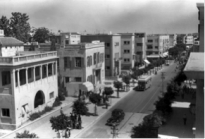
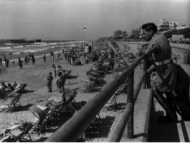
13:45 We screen a film on Erna Goldmann. This story was sponsored by the City of Frankfurt. We found Mrs Goldmann in a Tel Aviv old age home in 2010, where she shared with us stories of growing up in Frankfurt and fleeing to Tel Aviv in 1937. “All of Ben Yehuda Strasse spoke German!” she tells us, as only a genuine Yekke (Israeli slang for a German Jew) would. This film has been used by dozens of schools in Germany, Israel, and other countries.
14:00 An Israeli teacher (Michal Yousfan from Kfar Saba) will tell us how she used this film in class. Followed by discussion.
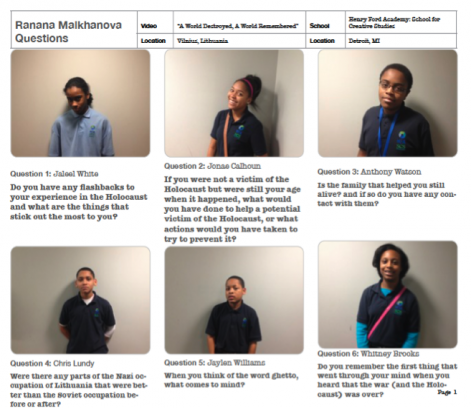
14:20 Ghetto: a word with different meanings
Mike Irwin teaches in a school in Detroit where 98% of the students are African American. When Mike wanted to teach them some about the Holocaust, his 13-year-olds said they knew all about ghettos. Some lived in what they call ghettos.
Mike connected his students with a Jewish school in Vilnius. Those kids also knew what a ghetto was. Most of their great-grandparents had lived in one—but of a very different sort.
Mike Irwin will make a presentation on how African-American students can learn about 20th century European history, the Holocaust and geography, while two teachers he worked with, Branislava Stevanovic in Belgrade and Gintare Liorančaitė in Vilnius, will tell us how their students connected with Mike’s students.
This will be a challenging and thought-provoking session, and we have several teachers from South and North Carolina who will talk about Holocaust education in minority schools.
15:20 Coffee break
15:40 Out of the Box projects

- Horatiu Suciu of Lugoj, Romania will present his graphic novel on Eva Deutsch, a story his students found on the Centropa website, as will Sascha Wöllert from Hannover, whose students are creating graphic novels from several Centropa interviews. Followed by Q&A.
- Lilach Taichman from Philadelphia will show us how her students create their own exhibitions to accompany Centropa exhibitions on Jewish life in 20th century Central and Eastern Europe, and how the students become researchers and exhibition guides. Lisa Sterling from Greensboro, North Carolina will present a family recipe cookbook project that she did with Bernadett Csehi, a Centropa teacher in Sopron, Hungary.
16:45 Elective line groups meet.
17:45 Finish program.
Free evening
Day three. Thursday, 25 July
The German line
9:00 Groups depart from their hotel for a short walking tour to the Cervantes Institute, which is located across from the site of the Rosenstrasse protest memorial.
Venue: Cervantes Institute, Rosenstraße 18.
10:00 Welcome remarks by our host
Three groups will meet simultaneously, and veteran Centropa teachers will lead the sessions.
- Germany focus group. The teachers listed below will find German stories relevant for their students, and in this session they will design lessons using the Centropa German films they’ve seen and the places they’ve visited so far. We have divided this group into smaller groups, and our German and Austrian teachers will disperse themselves among the groups as facilitators.
Each small group will designate
a) a note taker, responsible for writing down all ideas discussed, as well as the final lesson idea developed;
b) someone to present their ideas to the larger group.
* EU Jewish
* US Jewish
* Israeli educators
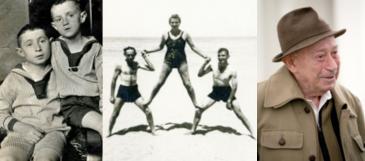
These groups will watch the film on Herbert Lewin, who began life in East Prussia before fleeing to Palestine and then settling in Vienna.
We will discuss the use of our German trilogy of Jewish films—Herbert Lewin, Rosa Rosenstein (whose story takes place in Berlin and we screened on our first day) and Erna Goldmann (whose story from Frankfurt we watched on our second day).
- Special projects group. These teachers will work on programs relevant for their students and they will discuss how they can create networks and partnerships together. Teachers from American public schools will be dispersed among these three groups, and Centropa veteran teachers will present their projects and lead the group discussion.

* Hungarian, Romanian and Serbian teachers will meet and discuss a video project on the synagogues of Timisoara, Szeged and Novi Sad, all of which were built by Lipot Baumhorn (pictured above).
* Other Balkan teachers (Macedonia, Bosnia) meet
* Polish teachers discuss using films and stories from the Centropa archive from their countries
* US public school teachers meet and discuss how to use stories about 1938 in class.
* Russian-speaking educators meet to discuss relevant Centropa films, and how to connect their students through family stories
11:00 Each group will have five minutes to present their ideas to the others.
11:30 Participants work in their elective line groups.
12:45 Lunch.
Sephardic afternoon
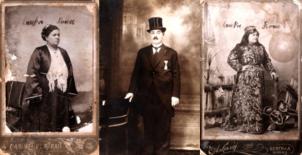
14:00 An introduction to our Balkan Sephardic heritage, and why we need it in our classrooms.
We begin with a discussion on Das Amt, the study commissioned by then Foreign Minister Joschka Fischer on the role of the Ministry during the Second World War.
14:15 It was while researching Das Amt that historians discovered that a diplomat by the name of Rademacher wrote on his expense report that the reason he went to Belgrade was for “the liquidation of the Jews of Serbia.” This leads into the showing of our film on the Kalef sisters of Belgrade, and how they were saved during the war (the photos above were the aunts and uncle of the Kalef girls. They were all murdered). Film screening followed by discussion.
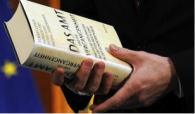
15:00 Coffee break
15:15 Participants will watch the following films in the groups listed below. After watching the films, these two groupings will break into sub-groups to discuss the film and how they can use it in their particular schools:
A. EU Jewish, US Jewish and Israeli teachers watch The Years Make Their Own, which tells the story of two Jewish partizans from Bitola. Most teachers in Jewish schools show stories of Lithuanian partisans, but almost none show information about Yugoslav partisans. We will discuss the reasons why and review the numbers of how many Jews fought with Tito’s partizans.
B. EU public and US public schools discuss how to use the Kalef film, and the story of Father Tumpej, who saved them, in their classes. Branislava Stevanovic of Belgrade will lead the discussion.
16:30 Each group takes five minutes to present their ideas to everyone who watched the same film.
16:55 Centropa`s official note taker summarizes the day, later posts the summary online
17:00 Session ends and free evening. Russian-speaking educators meet at 18:45 in hotel lobby for working dinner (location tba)
Day four. Friday, 26 July
8:00 Buses pick up participants. Note: we are spending the day as guests of the Jewish Museum, which was kind enough to open the museum earlier for us, so please be on time.
We will stop by the ruins of the Anhalter Bahnhof, where thousands of Jewish children were put on Kindertransports to England. For those preparing programs on the 75th anniversary of the beginning of the Kindertransports in November, this will be relevant for your work.
The Berlin Jewish Museum is one of the most-visited museums in Berlin and was designed by renowned architect Daniel Libeskind.
9:30 Karin Grimme (Jewish Museum) will talk about the architecture and the educational concept of the museum.
10:20 Restroom break
10:30 Teachers will be divided into five groups according to their choice, and will tour the permanent exhibition, learning of one aspect of Jews in modern German history.
11:45 Participants tour the remaining exhibition on their own.
12:15 Lunch in the Museum’s restaurant.
13:00 Poland and the shtetls line
Poland, Lithuania, and the battle for memory (we will be inviting the Polish and Lithuanian ambassador)
Lecture by Polish writer, journalist, Jewish community activist Konstanty Gebert on how Poles and Jews, and Poles and Lithuanians, and Lithuanians, Russians and Jews all see the same events through very different eyes. Followed by Q&A.
14:00 Screening of our Lithuanian film on Ranana Malkanova, a film that delves into Lithuania’s troubled and complex 20th century history, with an introduction about the difficulties of teaching Jewish history in Lithuania. Brief remarks by Konstanty Gebert and Ed Serotta.
14:30 Dual narratives, hearing the other side and changing your mind: How can we bring students to question their own assumptions and think critically about their own stance in the world?
Konstanty Gebert and the film about Ranana Malkhanova highlight the fact that we all have different ways of looking at the world, and at history. This has implications for how we teach history and how our students understand themselves in the world. Discussion moderated by Shmuel Afek.
15:00 Presentation by Jagna Kofta of the Jewish Museum Warsaw. Followed by Q&A.
15:30 Coffee break
15:50 Other narratives, the stories we don’t tell.
Teachers in US and EU Jewish schools, and Israeli teachers, will watch and discuss ways to use "So that memory doesn`t die -- A film about Teofila Silberring from Krakow. Discussion facilitated by Polish teachers.
Teachers in US and European public schools will watch and discuss ways to use the Haya Lea Detinko film in combination with “A Tale of Love and Darkness” by Amos Oz. Discussion facilitated by Russian-speaking teachers.
17:00 Each group presents results to larger group (five minutes maximum), followed by short feedback within the small groups. Each group assigns a note taker who jots down the feedback to the presentations, which will be posted online later that day.
17:30 Return to hotel;
18:00 Participants arrive at hotel, change for Shabbat. Dress Code Alert!
19:00 Shabbat services (optional) at the Rykestrasse Synagogue.
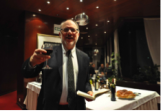
21:00 Shabbat dinner (mandatory) will be held in the Lauder Foundation on Brunnenstrasse. We will have a discussion on religion and ethics and this week’s Torah portion reading with Rabbi Michael Paley of New York. Rabbi Paley has spent the last year living in Budapest and has been a regular visitor to Jewish communities Central Europe since the late 1970s, when he worked in Romania. Rabbi Paley has attended Centropa seminars this last year in Belgrade, Jerusalem and Budapest. Official notetaker summarizes what we learned today.
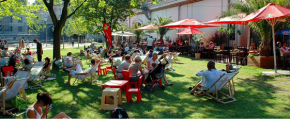
Day five. Saturday, 27 July
Morning service for those who keep shabbat. Others have free morning.
Optional: Tour of the Gleis 17 Memorial led by Frank Grellert (Start: S Bahn Station Grunewald at 10 am).
Please note: As this is an optional tour conducted by one of our teachers from Berlin, Centropa will not organize a bus for people to get there, meaning you have to get there yourself. Frank will later bring you to the lunch place.
Meet for lunch at the Ampelmann Café at 13:00. Stadtbahnbogen 159/160 (in Berlin-Mitte am Monbijoupark) where we will spend the afternoon—inside and out.
Civil Society / Righteous Gentile Line.
14:00 Book discussion on Beautiful Souls: Saying No, Breaking Ranks, and Heeding the Voice of Conscience in Dark Times, by Eyal Press. In this discussion, participants will discuss the book in general, how they can use it in class and write up any questions they have for Eyal Press’s Skype session on Monday.

15:00 Coffee break
15:15 The networks listed below will meet, discuss what they’ve experienced so far and see how they can use what they’ve learned to create a partnership with a teacher in another country for the coming year. Output: work plan and timeline for cooperative projects.
- US Jewish, EU Jewish teachers
- Polish, Israeli and German teachers
- Balkan and Austrian teachers
- US public, Hungarian, Lithuanian, Romanian teachers
16:15 Teachers from each group make a brief presentation on their workplan/timeline
16:45 Walking tour: We will visit the following sites: Museum island; Neue Wache; Book burning memorial; Gendarmenmarkt.
18:30 Visit of Holocaust memorial and its learning center, one of the most dramatic and effective—and minimalist—presentations we have ever seen.
19:30 Free evening
Day six. Sunday 28 July
German line, part 3. Weit von wo? - “Far from where” is the translation, and it is said that a German Jew, in 1939, met a friend on the street in Berlin, who asked if he had been lucky enough to get an exit visa and an invitation to another country. The first one said yes, to Yugoslavia. The second Jew said that he did, too, to Costa Rica. The first Jew said, “But it’s that far?” To which his friend replied, “Far from where?” meaning, once you lose your home, what does distance matter. This day will be spent thinking of exile—what Germany lost, what other countries gained, but how so much was lost by those who were uprooted.
9:00 Leave hotel. Participants have these choices and must sign up in advance so you can read up, and be prepared to take pictures:
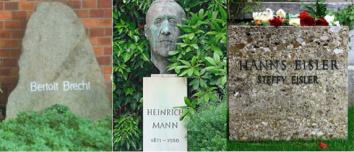
A) You can visit the Dorotheenstädtischer Friedhof, where some of the greatest names in Weimar culture are buried: Bertolt Brecht, Heinrich Mann and Hanns Eisler. Only Eisler was Jewish, but all three fled Nazi Germany for Los Angeles. Hounded for being Communists, Eisler and Brecht left America (Eisler was deported, Brecht left on his own accord) for the newly created GDR. Mann was considering doing the same, when he suffered a fatal heart attack. His body was shipped to Berlin. http://en.wikipedia.org/wiki/Dorotheenstadt_cemetery
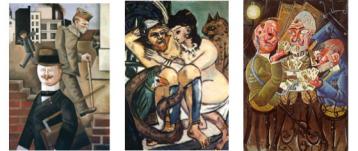
B) Visit the Berlinische Galerie and focus on Weimar-era artists such as George Grosz, Otto Dix, Max Beckmann, all of whom did an excellent job of showing what a cacophonous and jarring place Weimar-era Berlin was. http://www.berlinischegalerie.de/en/home/

C) Visit the Film Museum and concentrate on Weimar-era filmmaking—Murnau and Fritz Lang and others who fled Germany for Hollywood: Lang, Billy Wilder, others. http://www.deutsche-kinemathek.de/en
12:30 Lunch at Konrad Adenauer Foundation Akademie, Tiergartenstr. 35
13:15 Discussion: What we learned yesterday during the tour of Berlin-Mitte and the Holocaust Memorial
13:30 How to use Weimar culture in class—photography, music, art. We watch films made by students on 1920s Hungarian modernist photographers.
14:30 Elective Line groups work on their lesson plan / video
15:45 Coffee break
16:00 Elective Line groups finalize their projects and prepare for final day’s presentations.
17:00 Return to hotel by bus
19:00 Dinner
Official notetaker will summarize what we learned today.
Day seven. Monday, 29 July
FINAL CONFERENCE
8:15 Meet in hotel lobby
8:30 Bus leaves for final conference at the Friedrich Ebert Foundation.
9:00 Teachers present their elective line lesson plans and films during the morning.
11:00 Coffee break
11:15 Ten minute presentations: summations of each of the Centropa lines: German, Polish, Civil Society, Sephardic—why these are such critical subjects to teach and how we will use new technologies and our networks to teach them.
12:30 Lunch
13:15 Afternoon conference. Welcome remarks by Dr. Alexander Kallweit of the Friedrich Ebert Foundation
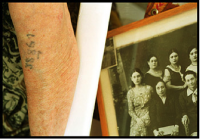
13:30 Salonika, City of Ghosts.
We begin with an introduction to Jewish Salonika, the port city known to Greeks as Thessaloniki. When the 20th century began, 93,000 Jews lived here, and nearly all of them could trace their family roots to 15th century Spain. The Jewish community was the largest ethnic minority in the city; it wasn’t even possible to unload a ship on the Jewish Sabbath. By the time the German Wehrmacht withdrew from Salonika in the fall of 1944, there were no Jews left alive in the city - around 1,000 Jews were there after the war. This is a story about two of Salonika’s families.
13:35 A Bookstore in Six Chapters tells the story of Renee and Solon Molho and their families.
Narrated by their daughter, Nina Molho, in English, Greek, French and Ladino, this powerful film takes us through the bustling streets and alleyways of pre-war Salonika. We then travel with Solon and Renee as a Spanish diplomat, a family of Greek farmers, and an Athens housewife save their lives during the Second World War. Afterwards, the newlyweds re-established the Molho bookstore, which remained the epicenter for Salonika’s literary scene—until it closed its doors in 2004.
14:00 Remarks by Secretary General of the Greek Ministry of Education (tbc)
14:15 Discussion led by Rabbi Michael Paley of New York.
During this year’s summer academy, we have watched films about the Molhos being saved by Greek Orthodox families in Glossa and Athens, a Sephardic family hidden in Serbia by a Catholic priest, and a mother and daughter protected by a family of Lithuanian farmers. Each of these Gentiles was awarded Righteous among the Nations status by Yad Vashem, Israel’s Holocaust Museum. The museum has bestowed thousands of such certificates to Christians and Muslims who reached out, risked their lives, and saved Jewish children, adults, and families during the Holocaust.
The Holocaust was modern man’s single greatest crime, with dimensions of evil that all but extinguish in our minds the tiny flickers of hope we know as Righteous Gentiles. Yet those tiny lights meant everything to those who encountered them. Now they are the examples we have of the good that was possible - and their stories enable us to teach our children the human hope, kindness and morality that was present for the lucky few.
14:45 Beautiful Souls by Eyal Press compels readers to think about why a few individuals made choices to stand up at times that were not in their best interest, and what happened to them.
Press introduces us to four men and women who listened to an inner voice that led them to make difficult and in some cases dangerous moral choices, and Press not only explores the complex reasons they did so but the social and economic consequences for their actions. We will discuss these complicated and challenging issues together, and in a video conference call with Eyal Press.
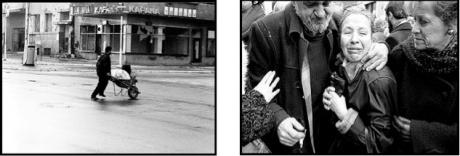
15:15 Sarajevo in the 1990s and the meaning of Never Again.
When war swept through Bosnia in 1992, the Bosnian Serbs besieged the multi-ethnic city of Sarajevo, and it would become the longest siege in modern European history. What happened in Bosnia during the 1990s war is as grim and depressing a chapter as one can imagine. But during the siege, the lights did indeed stay on in Sarajevo’s last remaining synagogue. A tiny group of Holocaust survivors and their offspring took the words never again and put them to work. They set up La Benevolencija (“good will” in Ladino), their own humanitarian aid agency. Who worked there? Jews and Muslims, Serbian Orthodox and Catholic Croats.
15:20 We will screen Centropa’s film "Survival in Sarajevo", which tells the story of how when governments failed, civil society took its place. Followed by discussion.
15:45 Jakob Finci, president of La Benevolencija, will tell us of the work his organization did during the war.
16:00 Coffee break. Participants walk through the Sarajevo exhibition that is now traveling Germany and Austria.
17:00 Centropa’s official note taker summarizes the day, later posts the summary online
17:10 Final session. Feedback and evaluation of the seminar
What worked best in this seminar? What needs to be changed? What projects will you carry out?
18:00 Program ends

